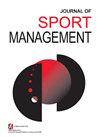具有健康意识的体育迷的身份冲突分析
IF 3.5
2区 管理学
Q1 HOSPITALITY, LEISURE, SPORT & TOURISM
引用次数: 0
摘要
学者们已经开始探索体育迷的突出等级中的多重身份之间的相互作用,注意到球迷可能会与其他核心角色竞争。研究人员最近也强调了粉丝的健康结果,越来越关注身体健康。虽然体育消费行为与健康意识是同时出现的,但二者之间的社会心理联系尚不清楚。因此,我们的目的是澄清这种关系。我们利用一种新兴的定量方法:多项式回归和响应面方法。我们的研究结果表明,重视粉丝和健康意识的个体(即表现出高度的粉丝身份和健康意识一致性)经历身份冲突,男性报告的身份冲突水平高于女性。因此,我们撰写了关于粉丝身份潜在负面(或挑战)的文献。粉丝文化中常见的食物和久坐不动似乎会引发注重健康的人的心理动荡。粉丝身份可能会自然地与其他社会角色融合,但我们的研究结果表明,粉丝和健康意识经常被视为冲突。本文章由计算机程序翻译,如有差异,请以英文原文为准。
An Analysis of Identity Conflict Among Health-Conscious Sport Fans
Scholars have begun to explore the interplay between the multiple identities within a sport fan’s salience hierarchy, noting fandom may compete with other central roles. Researchers have also recently emphasized well-being outcomes for fans, with increasing focus on physical health. Though sport consumer behavior and health consciousness have concurrently emerged, the social psychological connection between the two is unclear. Thus, we aim to clarify this relationship. We leverage an emerging quantitative approach: polynomial regression and response surface methodology. Our findings indicate individuals who value both fandom and health consciousness (i.e., demonstrate high fan identity and health consciousness congruence) experience identity conflict, with men reporting higher levels of identity conflict than women. Thus, we contribute to literature on the potential negative sides (or challenges) of fan identity. The food and sedentarism common to fan culture appear to prompt psychological turmoil for health-conscious individuals. Fan identity may naturally integrate with other social roles, yet our results indicate fandom and health consciousness are often viewed in conflict.
求助全文
通过发布文献求助,成功后即可免费获取论文全文。
去求助
来源期刊

Journal of Sport Management
社会科学-运动科学
CiteScore
5.80
自引率
19.40%
发文量
33
审稿时长
>12 weeks
期刊介绍:
The sport management industry is growing by leaps and bounds, with an explosion in research projects, texts, and university programs. As the field continues to rapidly evolve, it’s imperative for sport managers to keep abreast of the latest developments. The peer-reviewed Journal of Sport Management (JSM) is your key to staying on top of current issues and trends in this dynamic field. An official journal of the North American Society for Sport Management, JSM brings you thought-provoking editorials, research articles, and reviews that examine a number of areas as they relate to the management, governance, and consumption of sport, such as: organizational theory, behavior, and strategy; sport operations; marketing, consumer behavior, sponsorship, advertising, and licensing; media, communications, and public relations; sport tourism; facility and event management; and gender and diversity.
 求助内容:
求助内容: 应助结果提醒方式:
应助结果提醒方式:


